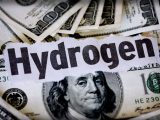
JCB signs major green hydrogen import deal
November 5, 2021The agreement makes Fortescue Future Industries the clean H2 supplier for the British firm.
A new multibillion-dollar green hydrogen import agreement has been struck between JCB in the UK and Australia’s Fortescue Future Industries, drawing the attention of major firms worldwide.
Fortescue has stated that the deal makes it the leading supplier of clean H2 to the United Kingdom.
The recent announcement brought Fortescue to say that it was becoming the leader among green hydrogen companies supplying the United Kingdom. This followed the official announcement of the memorandum of understanding (MoU) between the JCB construction equipment firm and Ryze Hydrogen. The companies did not specify exactly how much the deal was for, though Fortescue referred to it as a “multi-billion-pound deal”.
The agreement has JCB and Ryze purchasing 10 percent of Fortescue’s global green H2 output. The UK companies will be managing the distribution of the renewable energy fuel alongside the UK’s “development of customer demand,” said the announcement.

The companies view this as an important opportunity to accelerate green hydrogen demand.
“This is an important step towards getting green hydrogen to the customer,” said JBC chair Anthony Bamford and father of Ryze founder and executive chair Jo Bamford. “It’s fine having an engine powered by green hydrogen, but no good if customers can’t get green hydrogen to fuel their machines,” he added. “This is a major advance on the road towards making green hydrogen a viable solution.”
Last month, JCB had already announced that it would be investing £100 million (USD$136.5 million) into a “super-efficient hydrogen engines” production project.
Fortescue Future Industries is a subsidiary of Fortescue Metals Group Ltd. from Australia. It has predicted that green hydrogen production will have reached an annual 15 million metric tons by 2030. Once that step has been reached, production will only accelerate until they reach 50 million metric tons per year.
This aligns with many predictions from other companies in the industry. Clean H2 received considerable spotlight time at COP26. That said, many challenges and barriers will need to be overcome before widespread and mainstream use of the clean fuel can be achieved.



 With over 15 years of reporting hydrogen news, we are your premier source for the latest updates and insights in hydrogen and renewable energy.
With over 15 years of reporting hydrogen news, we are your premier source for the latest updates and insights in hydrogen and renewable energy.
Thank goodness these entrepreneurs have the foresight to provide this invaluable fuel
I would like to be able to buy a fuel cell powered car of decent size and range fuelled by green H2.Hardly any H2 fuel stations outside thesoutheast
What are She’ll, BP and the others doing about becoming suppliers for the domestic market?
We need action to move forward on CO2 pollution, by getting H2retailing going